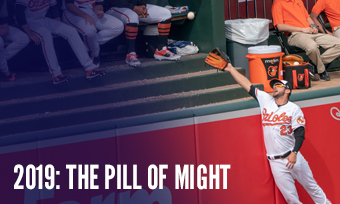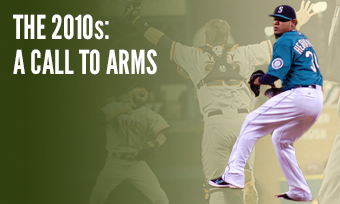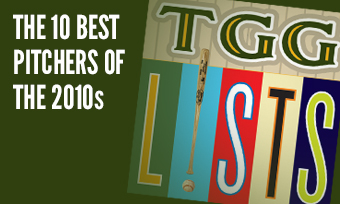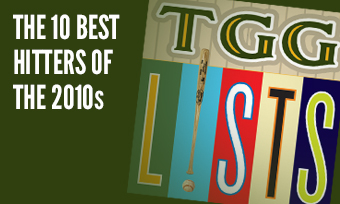The Yearly Reader
Leaders and Honors, 2019
Our list of baseball’s top 10 hitters and pitchers in both the American League and National League for the 2019 baseball season, as well as the awards and honors given to the game’s top achievers of the year.
The National League’s Top 10 Hitters, 2019
Bold type in brick red indicates league leader.
1. Cody Bellinger, Los Angeles
Key Numbers: .305 average, 121 runs, 170 hits, 34 doubles, 47 home runs, 115 RBIs, 95 walks, 21 intentional walks, 15 stolen bases.
Bellinger’s consolation for having Pete Alonso erase his 2017 NL rookie home run record was to win the NL MVP.
2. Christian Yelich, Milwaukee
Key Numbers: 130 games, .329 average, 100 runs, 29 doubles, 44 home runs, 97 RBIs, 80 walks, 30 stolen bases, .429 on-base percentage, .671 slugging percentage.
Yelich’s shot for a second straight MVP was literally broken up when he fractured his kneecap with three weeks to play.
3. Anthony Rendon, Washington
Key Numbers: .319 average, 117 runs, 174 hits, 44 doubles, 34 home runs, 126 RBIs, 80 walks, 12 hit-by-pitches.
Stepping out of the shadows of the departed Bryce Harper, Rendon exploded with an MVP-level effort that led to a bank-busting contract of his own as the latest high-priced Angel for 2020.
4. Juan Soto, Washington
Key Numbers: .282 average, 110 runs, 32 doubles, 5 triples, 34 home runs, 110 RBIs, 108 walks, 12 stolen bases.
The likely heir apparent to Rendon’s brief reign as Washington’s top hitter, Soto continued his impressive rise at age 20, constantly erasing Mel Ott from the “Before Turning 21” section of the record book.
5. Freddie Freeman, Atlanta
Key Numbers: .295 average, 113 runs, 176 hits, 34 doubles, 38 home runs, 121 RBIs, 87 walks.
Not only was the Year of the Home Run kind to the veteran first baseman, who set a career mark in round-trippers, but so were the generously short right-field dimensions at Truist Park, where he deposited 22 of his blasts. On the RBI front, he tied Vern Stephens’ team mark with 10 straight games knocking in at least one run.
6. Ketel Marte, Arizona
Key Numbers: .329 average, 97 runs, 187 hits, 36 doubles, 9 triples, 32 home runs, 92 RBIs, 10 stolen bases.
The exciting young infielder had an Arizona-record streak of nine straight starts with at least two hits, a career record-smashing 32 home runs (compared to a total of 22 hit over four previous years) and finished just a hair behind Christian Yelich for the batting title when he, too, got hurt before the regular season finale.
7. Nolan Arenado, Colorado
Key Numbers: .315 average, 103 runs, 185 hits, 31 doubles, 41 home runs, 118 RBIs.
When all else fails—and pretty much everything else did for the Rockies—there was Arenado, who justified the first season of his whopping eight-year, $260 million contract.
8. Ronald Acuna Jr., Atlanta
Key Numbers: .280 average, 127 runs, 175 hits, 41 home runs, 101 RBIs, 188 strikeouts, 37 stolen bases.
The dynamic Acuna became the second youngest major leaguer (after Mike Trout in 2012) to go 30-30; had he not gotten so banged up in the season’s final weeks, he would have had a decent shot at 40-40.
9. Josh Bell, Pittsburgh
Key Numbers: .277 average, 94 runs, 37 doubles, 37 home runs, 116 RBIs.
After a lost sophomore campaign, Bell re-energized and launched PNC Park’s fourth and fifth home runs into the Allegheny River.
10. Pete Alonso, New York
Key Numbers: .260 average, 103 runs, 30 doubles, 53 home runs, 120 RBIs, 21 hit-by-pitches.
All but lobbied by Mets teammates to be granted an Opening Day roster spot after smashing the ball in Spring Training, Alonso merited the inclusion with all-time season home run records by a rookie and by a Met—regardless of time of service.
The American League’s Top 10 Hitters, 2019
1. Alex Bregman, Houston
Key Numbers: .296 average, 122 runs, 37 doubles, 41 home runs, 112 RBIs, 119 walks.
While most everyone else was striking out left and right, Bregman whiffed a relatively low 83 times—the fewest by a 40-homer guy since Albert Pujols in 2009.
2. Mike Trout, Los Angeles
Key Numbers: 134 games, .291 average, 110 runs, 27 doubles, 45 home runs, 104 RBIs, 110 walks, 14 intentional walks, 16 hit-by-pitches, 11 stolen bases, .438 on-base percentage, .645 slugging percentage.
Despite a bum foot, Trout thanked the Angels for gracing him with a North American sports-record $432 million extension by registering strong enough numbers to grab his third MVP—though it was close, edging Alex Bregman by a 355-335 point total.
3. Rafael Devers, Boston
Key Numbers: .311 average, 647 at-bats, 129 runs, 201 hits, 54 doubles, 32 home runs, 115 RBIs.
At age 22, Devers became the youngest Red Sock to knock in 100 runs since Ted Williams in his rookie 1939 season.
4. Xander Bogaerts, Boston
Key Numbers: .309 average, 110 runs, 190 hits, 52 doubles, 33 home runs, 117 RBIs.
Along with Devers, Bogaerts became part of the first pair of teammates to amass 50 doubles and 30 homers each in the same season.
5. Mookie Betts, Boston
Key Numbers: .295 average, 135 runs, 176 hits, 40 doubles, 5 triples, 29 home runs, 80 RBIs, 97 walks, 16 stolen bases.
Red Sox fans got to enjoy Betts while they had him; he led the AL in runs for the second straight year, doubled 40-plus times for the fifth straight season and produced his fifth career three-homer game. Then Boston said bye-bye by dealing him to the Dodgers.
6. Nelson Cruz, Minnesota
Key Numbers: 120 games, .311 average, 81 runs, 26 doubles, 41 home runs, 108 RBIs.
Better late than never: Nelson Cruz enjoyed his first two home run hat tricks—10 days apart—at age 39. Additionally, he set an MLB record by collecting at least 10 total bases in six games.
7. George Springer, Houston
Key Numbers: 122 games, 96 runs, 39 home runs, 96 RBIs.
Like Nelson Cruz above, Springer could have hit over 50 homers had he not lost the opportunity to play in 40 games.
8. Marcus Semien, Oakland
Key Numbers: 162 games, .285 average, 657 at-bats, 123 runs, 187 hits, 43 doubles, 7 triples, 33 home runs, 92 RBIs, 87 walks, 10 stolen bases.
Mostly known in earlier years as an error machine at shortstop, Semien acquired a more positive reputation as an elite leadoff hitter while playing every game.
9. J.D. Martinez, Boston
Key Numbers: .304 average, 98 runs, 175 hits, 33 doubles, 36 home runs, 105 RBIs, 92 walks.
The veteran slugger didn’t have the monster numbers of his previous two seasons, but .304-36-105 is still nothing to critically pick at.
10. Jorge Soler, Kansas City
Key Numbers: 162 games, .265 average, 95 runs, 33 doubles, 48 home runs, 117 RBIs, 178 strikeouts, 10 hit-by-pitches.
One of the few busts in the Theo Epstein era at Chicago, Solar got a needed change of scenery and destroyed the Royals’ franchise home run record—and erased Kansas City as the sole remaining occupant from the list of a teams who never had a 40-homer hitter.
The National League’s Top 10 Pitchers, 2019
1. Hyun-Jin Ryu, Los Angeles
Key Numbers: 2.32 ERA, 14 wins, 5 losses, .737 win percentage, 29 starts, 182.1 innings, 24 walks.
Ryu’s hot start included 14 straight starts in which he allowed no more than two runs and a walk.
2. Mike Soroka, Atlanta
Key Numbers: 2.68 ERA, 13 wins, 4 losses, .765 win percentage, 29 starts, 174.2 innings, 41 walks, 23 grounded into double plays.
The Atlanta rookie was undefeated in his first 16 road starts before finally taking a loss.
3. Jacob deGrom, New York
Key Numbers: 2.43 ERA, 11 wins, 8 losses, 32 starts, 204 innings, 44 walks, 255 strikeouts, 24 stolen bases allowed.
It was a bittersweet encore for the reigning Cy Young Award winner, who won it again—but did it once more with little to show for it in the victory column; of his 24 quality starts, he won only 11 of them.
4. Stephen Strasburg, Washington
Key Numbers: 3.32 ERA, 18 wins, 6 losses, .750 win percentage, 33 starts, 209 innings, 251 strikeouts, 10 hit-by-pitches.
In the midst of one of his precious few full healthy campaigns, Strasburg didn’t limit his achievements to the mound; he became the first pitcher since 2010 to collect two hits (including a home run) in a single inning, July 18 at Atlanta.
5. Will Smith, San Francisco
Key Numbers: 2.76 ERA, 6 wins, 0 losses, 34 saves, 4 blown saves, 63 appearances, 65.1 innings.
No, not the Men in Black actor—and not the Dodgers’ rookie catcher—this Will Smith easily gave the Giants their first marquee closer since Brian Wilson during the recent glory days of three world titles.
6. Jack Flaherty, St. Louis
Key Numbers: 2.75 ERA, 11 wins, 8 losses, 33 starts, 196.1 innings.
The second-year Redbird was the latest in a recent string of pitchers (i.e. Jake Arrieta) who proved unstoppable in the second half, registering a 0.91 ERA after the All-Star Break; five times, he entered the fifth inning having not allowed a hit.
7. Clayton Kershaw, Los Angeles
Key Numbers: 3.03 ERA, 16 wins, 5 losses, .762 win percentage, 28 starts, 178.1 innings, 41 walks.
The Dodgers ace worked up unbeaten streaks of 22 straight home starts, 17 overall starts and 16 starts against the Padres.
8. Felipe Vazquez, Pittsburgh
Key Numbers: 1.65 ERA, 5 wins, 1 loss, 28 saves, 3 blown saves, 56 appearances, 60 innings, 6 grounded into plays.
A terrific year on the mound was nevertheless turbulent enough for Vazquez because of several run-ins with teammates in a toxic Pirates clubhouse—but then he got in real trouble with the law for trying to pick up on a 13-year-old girl.
9. Walker Buehler, Los Angeles
Key Numbers: 3.26 ERA, 14 wins, 4 losses, .778 win percentage, 30 starts, 2 complete games, 182.1 innings, 37 walks.
The young, strong, right-handed Buehler had few days off; in five of his starts, he struck out 10 or more batters without a walk.
10. Sonny Gray, Cincinnati
Key Numbers: 3.15 ERA, 11 wins, 7 losses, 33 starts, 200 innings, 48 walks.
All but rattled from a rotten experience with the Yankees, Gray found newfound peace and success in Cincinnati; he didn’t allow more than six hits in any of his starts, a record streak that would continue into 2021.
The American League’s Top 10 Pitchers, 2019
1. Gerrit Cole, Houston
Key Numbers: 2.50 ERA, 20 wins, 5 losses, .800 win percentage, 33 starts, 212.1 innings, 48 walks, 326 strikeouts.
The heat-dealin’ ace ended the year with a 16-game win streak, a 10-game streak with double-digit strikeouts, the most K’s by an AL pitcher since Nolan Ryan in 1977 and a remarkable 13.82 per nine innings, breaking Randy Johnson’s 2001 record. All of this, just in time for free agency.
2. Justin Verlander, Houston
Key Numbers: 2.58 ERA, 21 wins, 6 losses, .778 win percentage, 34 starts, 223 innings, 42 walks, 300 strikeouts.
Verlander tossed his third career no-hitter and became, along with Gerrit Cole, part of the second set of teammates (after Randy Johnson and Curt Schilling in 2002) to each accrue 300 strikeouts in the same year. And, finally, he won a close postseason award vote, edging Cole for AL Cy Young honors.
3. Charlie Morton, Tampa Bay
Key Numbers: 3.05 ERA, 16 wins, 6 losses, .727 win percentage, 33 starts, 194.2 innings, 12 hit-by-pitches.
The best non-Astro on this list is an ex-Astro, as Morton spread some of the ol’ Houston pitching magic in his first year with the Rays.
4. Eduardo Rodriguez, Boston
Key Numbers: 3.81 ERA, 19 wins, 6 losses, .760 win percentage, 34 starts, 203.1 innings, 75 walks, 20 grounded into double plays.
The Venezuelan-born southpaw thanked all those big Boston hitters listed above for reaching 19 wins, as the Red Sox supported him with an average of nearly seven runs per game; he couldn’t snag #20 as the bullpen blew a tight lead he gave it in his last start. Although Rodriguez led the AL in walks, it was the lowest-ever total by an AL leader in a non-shortened season.
5. Shane Bieber, Cleveland
Key Numbers: 3.28 ERA, 15 wins, 8 losses, .652 win percentage, 33 starts, 3 complete games, 2 shutouts, 214.1 innings, 40 walks.
The Indians were so enamored with the young Bieber—who Topps accidentally ID’d as “Justin Bieber” on the back of his card—that he helped make veteran ace Corey Kluber (traded to Texas) expendable.
6. Lucas Giolito, Chicago
Key Numbers: 3.41 ERA, 14 wins, 9 losses, 29 starts, 3 complete games, 2 shutouts, 176.2 innings.
A year after posting the majors’ worst ERA, Giolito performed an impressive about-face.
7. Roberto Osuna, Houston
Key Numbers: 2.63 ERA, 4 wins, 3 losses, 38 saves, 6 blown saves, 66 appearances, 65 innings.
The ex-Toronto closer, given a cool welcome by Astros teammates in 2018 after being charged with domestic violence, gradually won them over with a solid first full year in Houston.
8. Aroldis Chapman, New York
Key Numbers: 2.21 ERA, 3 wins, 2 losses, 37 saves, 5 blown saves, 60 appearances, 57 innings.
Though he was no longer averaging over 100 on the radar gun, the 31-year-old Chapman was still too fast for many an opponent—and ran his streak of consecutive batters struck out at All-Star games up to six.
9. Jake Odorizzi, Minnesota
Key Numbers: 3.51 ERA, 15 wins, 7 losses, .682 win percentage, 30 starts, 159 innings.
The former Rays pitcher, in his second season at Minnesota, had a strong mid-spring performance—going 10-0 record within a 12-start stretch. He certainly wasn’t spared the trend of coaches playing it safer than sorry and pulling pitchers early, as he only completed seven innings twice—thus not qualifying for the AL ERA title despite 30 starts.
10. Brandon Workman, Boston
Key Numbers: 1.88 ERA, 10 wins, 1 loss, 16 saves, 6 blown saves, 73 appearances, 71.2 innings, 29 hits allowed, 45 walks.
Amid a lost Boston bullpen, Workman came to the rescue, gradually assumed the closer role and gave up an insane .123 opposing batting average.









